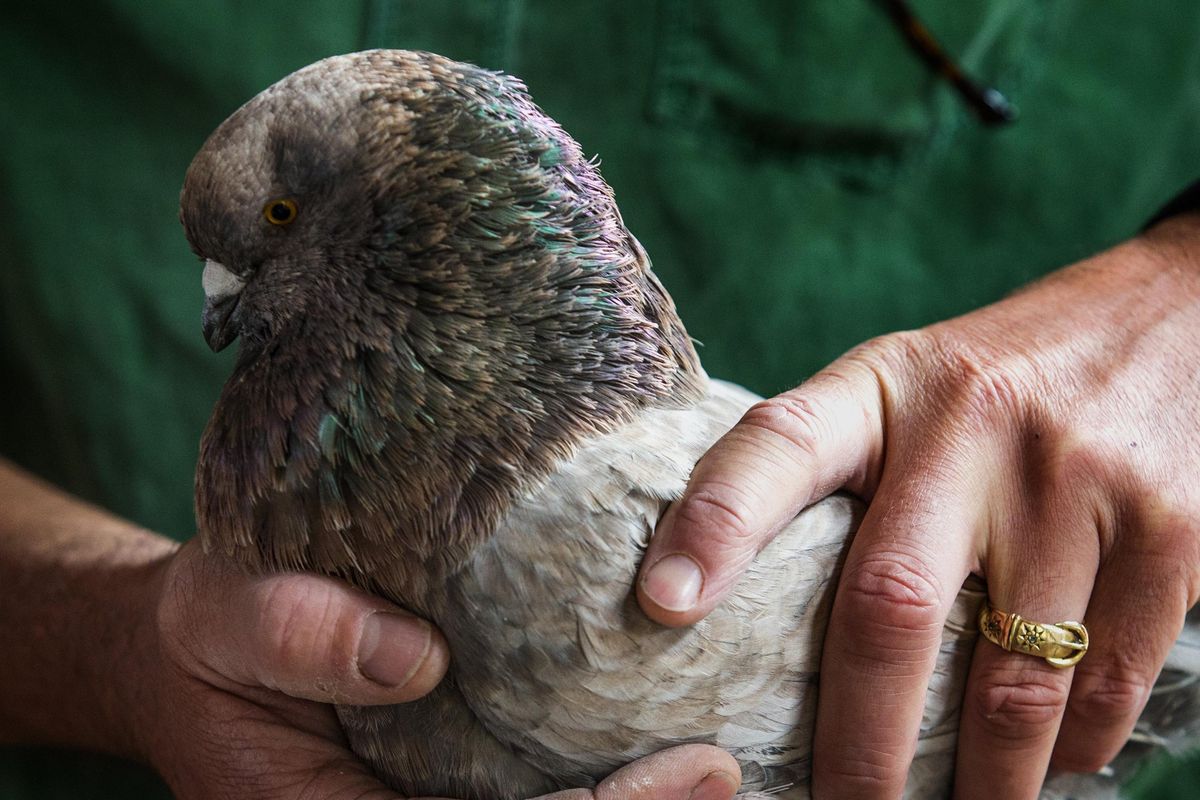This son of hippie parents raises pigeons to be birds of a pageant

SEATTLE – Keith Chadd has always loved pigeons. He found his first bird when he was 5 years old, in Coos Bay, Oregon. His parents were chopping wood on the beach and he crawled underneath the pier, and spied a baby pigeon. He snagged it and brought it to his mom.
“My mom couldn’t get it out of my hands, and she said, ‘OK, you can keep it,’ ” he recalled, laughing.
Chadd – who mainly breeds the English Carrier, French Mondain and Old German Owl varieties of pigeons – recently competed (once again) in a pigeon contest at the Washington State Fair.
Chadd thinks it’s genetic, in a way, this pigeon obsession. His grandmother and great-grandmother were both obsessed with pigeons and other birds, too.
“I’ll always have parents who come in, and they’re like, ‘I don’t know what to do with my kid,’ because they love the pigeons,” he said. “There’s something they love about the pigeons. And the parents are wondering why. They don’t understand it.”
And no doubt, it’s an obsession. Chadd’s got three pigeon lofts (that he built himself) on a 15-acre farm in Tacoma, where he lives with his partner of 26 years. The farm has trees of all kinds (pear, apple, cherry) and a cluster of dahlias, which he used to sell. An epic, giant pumpkin is situated next to a tall wooden Warri bee hive that he also built himself and where he’s farming natural organic honey. A herd of sheep and llamas and alpacas; three standard poodle and komondor mixed-breed dogs (Mike, Jack and Craven); three ragdoll cats (Sparrow, Bluebell and Momma Kitty); an unknown number of hens and White Brahma and Malaysian Serama chickens; a pair of peacocks and four peahens roam the rambling grounds that he and his partner bought after the 9/11 attacks.
And, of course, there are the pigeons. He guessed that he has more than 75.
He’s been showing them in regional and national contests since the late ’80s. He’s won Best of Show numerous times at both the local and national levels.
Most people don’t associate pigeons with beauty – but the German Owl has a fluffy plumage that makes it seem regal, and the English Carrier pigeon, with the cauliflower-esque formations on its beak and an elongated neck, looks nothing like the pigeons flying around New York City (the Columba Livia Domestica, which Chadd said are essentially a domesticated breed that thrive in a man-made environment).
One of Chadd’s birds, a French Mondain, is the national winner for Best Utility. Weighing an ideal 2 pounds, the bird (it has no name; each of his pigeons has only a number) had a round bottom, with a light beige-ish gray, almost taupe feather color, and an iridescent sheen around its face. If a restaurant has squab on the menu, this breed will likely be served – usually rare.
Chadd, though, says he very seldom indulges in his feathered friends.
“They are pets for me; some of them are more of a pet than others,” he said.
When he’s not breeding pigeons or tending to his flock, Chadd, 49, is a flight attendant for Alaska Airlines, where he has worked for the past 20 years. He’s got seniority so he flies 10 days a month during the summer (more in the winter), working mostly long-haul flights to the East Coast or to Hawaii. The rest of the time he’s working on the farm.
In a way, his unusual lifestyle was destiny. His parents were followers of ’60s novelist Ken Kesey, and he grew up on a farm in Oregon with 10 siblings.
“Yeah, my parents were definitely hippies,” he said. “It’s interesting because I have three kids, and all my kids are, like, organic farmers and stuff like that. I was talking to my son a couple of years ago, and I said, ‘Yeah, I’m so glad I got out of that commune … You live on a 15-acre farm in the city and you donate all this money to the community and you only eat locally and your kids are all organic farmers. You got away, you escaped,’ ” laughed Chadd. “He’s like, ‘Dad you’re doing exactly what they trained you to do.’ ”
“Why do I love them so much? I don’t know,” he said. “Everybody who’s into pigeons just loves them … I just think they’re so special.”